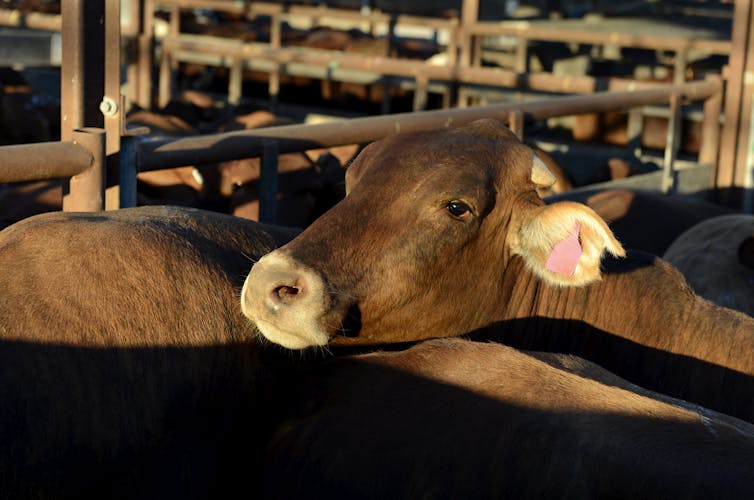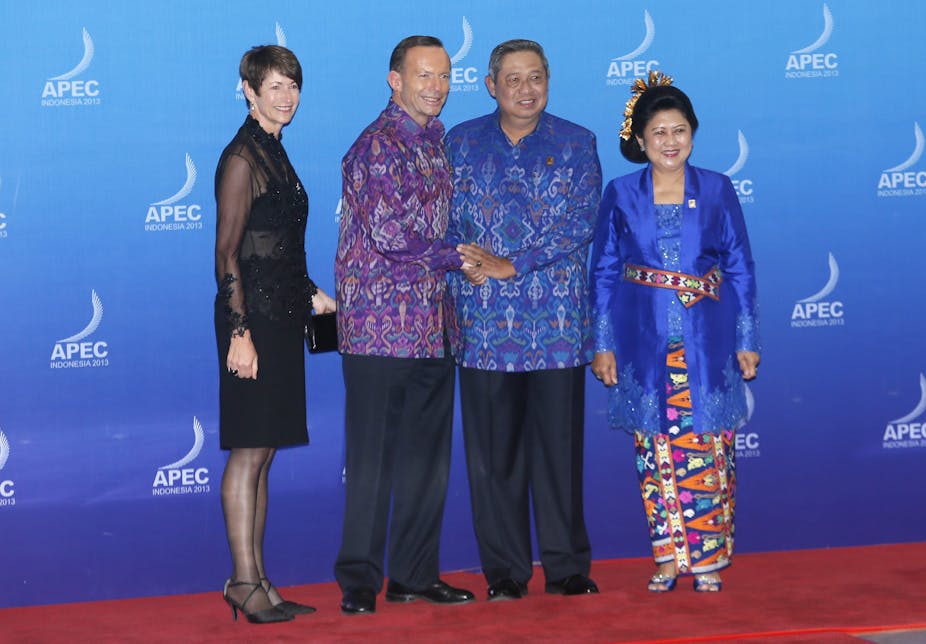There’s a widespread perception in Australia that Indonesian president Susilo Bambang Yudhoyono’s reaction to Australia’s phone tapping is all about playing domestic politics in Yudhoyono’s home country. It only superficially relates to the election or to shoring up support for Yudhoyono’s party – it really boils down to personal pride.
One rule of espionage holds that even friends should spy on each other. But the rules of diplomacy hold that if you are caught, you had better be apologetic.
How might it look to the Indonesians?
There is no way around the fact that Indonesia is annoyed. It’s a cliché to say that saving face is important in Asian culture, but there is an underlying truth to this in Indonesian culture.
Malu means to be shy, embarrassed or ashamed. It’s a very ambivalent feeling which one both rejects and aspires to. In one sense, you don’t want to be too malu. Indonesians often feel malu, for example, that their nation doesn’t get into the World Cup, that their technology is relatively undeveloped, and so on.
And yet, a malu person is humble and modest. In this sense, it is a very esteemed quality in an individual, and crucial in restraining passions such as sexual drive and anger. It enables one to negotiate – and perhaps even gracefully manipulate – social situations and interactions. But it also means to know one’s place.
If you don’t act malu when you should, you risk offending somebody. And one very formal – if rarely used – insult is tidak tahu malu, or: “you don’t have a sense of shame”. This was a prominent theme when Indonesian president Susilo Bambang Yudhoyono complained on Twitter about “the statement by Australia’s PM that belittles that spying on Indonesia”, which was without rasa bersalah, which means “without feeling guilty/wrong” or “without remorse”.
The flipside of this is bangga, which is self-esteem. In a perverse way, being spied on by United States and (to a much lesser extent) Australia demonstrates to Indonesia its importance in global politics. Also, through being malu, Indonesia may be able to manipulate this situation, creating a sense of pride.
So, in a contradictory way the problem is that Indonesia feels too malu and Australia is not malu enough. In other words, Australia and prime minister Tony Abbott have not acted appropriately towards Indonesia and Yudhoyono. It’s not so much about saying sorry (as many Australians have urged of Abbott), but more about adopting the correct demeanour for the situation.
For both sides there will be posturing. Abbott has to appeal to his domestic constituency and Indonesian politicians are gearing up for national elections in 2014. But underneath this, a serious issue of malu resides for Indonesia.
Yudhoyono yesterday escalated the diplomatic crisis by suspending joint Australia-Indonesia patrols to combat people smuggling and other military co-operation and intelligence sharing activities. Abbott responded by taking to parliament to express:
…deep and sincere regret about the embarrassment to the president and to Indonesia that’s been caused by recent media reporting.
Foreign minister Marty Natalegawa’s reaction to this was:
I don’t get it. Why would the President of Indonesia be embarrassed? I believe the embarrassment should belong to the government of Australia.
So Abbott is now at a crossroads. He can back down and try to restore co-operation, or risk the relationship crumbling, which could have major implications for both nations.
For Indonesia, among what is at stake is Australian aid. Australia, the largest bilateral grant-based donor to Indonesia, has invested A$1,378 million in the previous three years. But it is worth noting that Indonesia no longer wants to be considered the poor neighbour. It wants to be proud (bangga) of the fact that it is the largest economy in southeast Asia, and it is projected to be the world’s seventh largest economy by 2030.
For Australia, trade is one key issue at stake. Indonesia is Australia’s third largest agriculture market, with exports worth A$2.3 billion in 2012. Australia’s main agricultural exports to Indonesia are wheat, cotton, live animals, meat, horticultural products and sugar. Indonesia buys, Australia provides.

But Indonesia is trying to attain self-sufficiency by purchasing land in Australia to provide for its own needs in cattle export. For Indonesia, this is another show of pride (bangga) that Indonesia has the economic capabilities to do so; as well as being Australia’s important “market”.
The education sector, however, seems relatively insulated. For Indonesians, there is pride (bangga) in being educated in an Australian institutions just like the vice president Boediono (Monash) and foreign minister Marty Natalegawa (ANU). This area of Indonesian investment in Australia therefore appears safe.
So, what’s the upshot of the diplomatic row? It’s clear that Abbott leads a rookie government that has backed itself into a corner. It’s time for the prime minister to learn a thing or two about Indonesian culture and how to work with world leaders in the region. In the meantime, he may end up feeling malu if the boats start arriving after Indonesia stops co-operating.

